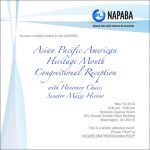| For Immediate Release: Date: December 10, 2024 | Contact: Rahat N. Babar, Deputy Executive Director |
WASHINGTON – The National Asian Pacific American Bar Association (NAPABA) congratulates Rep. Grace Meng (NY-06) on her election as Chair of the Congressional Asian Pacific American Caucus (CAPAC) for the 119th Session of Congress and Rep. Judy Chu (CA-28) as she assumes the role of Chair Emerita.
“NAPABA extends its heartfelt congratulations to CAPAC Chair-Elect Grace Meng,” said Thy Bui, President of NAPABA. “Chair-Elect Meng has paved a path to public service for so many as the first Asian American elected to Congress from New York. We look forward to her tenure and continuing our close partnership with CAPAC under her leadership.”
“Chair Judy Chu’s leadership, both within the Asian American, Native Hawaiian, and Pacific Islander (AANHPI) community and for our Nation, is nothing short of extraordinary,” said Priya Purandare, Executive Director of NAPABA. “From fighting against anti-Asian hate and racial profiling in all their forms to standing up for immigrant communities and families, our community has immensely benefited from Chair Chu’s zealous and unrelentless advocacy.”
“Chair Chu’s contributions to our community and our country extends well beyond her steadfast leadership of CAPAC for the past 14 years,” continued Executive Director Purandare. “We are incredibly humbled to call Chair Chu a friend of NAPABA. We honor her service and extend our deepest gratitude.”
NAPABA congratulates the newly elected leadership of CAPAC: First Vice Chair-Elect Rep. Mark Takano (CA-39), Second Vice Chair-Elect Rep. Jill Tokuda (HI-02), Whip-Elect Rep. Ami Bera (CA-06), and Freshman Representative Rep.-elect Suhas Subramanyam (VA-10).
Finally, NAPABA congratulates all newly elected and reelected AANHPI members of the 119th Congress, who are a part of the record number of AANHPI candidates from both parties who ran for state and federal offices throughout the United States and its territories. They are: Sen. Mazie Hirono (HI), Sen. Andy Kim (NJ), Rep.-elect Yassamin Ansari (AZ-03), Rep. Ami Bera (CA-06), Rep. Judy Chu (CA-28), Rep. Vince Fong (CA-20), Rep. Pramila Jayapal (WA-07), Rep. Ro Khanna (CA-17), Rep. Young Kim (CA-40), Rep. Raja Krishnamoorthy (IL-08), Delegate-Elect Kimberlyn King-Hinds (Northern Mariana Islands), Rep. Ted Lieu (CA-36), Rep. Doris Matsui (CA-07), Rep. Grace Meng (NY-06), Rep.-elect Dave Min (CA-47), Congressman James Moylan (Guam), Congresswoman Aumua Amata Radewagen (American Samoa), Rep. Bobby Scott (VA-03), Rep. Marilyn Strickland (WA-10), Rep.-elect Suhas Subramanyam (VA-10), Rep. Mark Takano (CA-39), Rep.-elect Derek Tran (CA-45), Rep. Shri Thanedar (MI-13), Rep. Jill Tokuda (HI-02).
To learn more about AANHPI candidates in the 2024 General Election, please visit the Asian Pacific American Institute for Congressional Studies (APAICS).
To learn more about CAPAC and its history, please visit its website.


